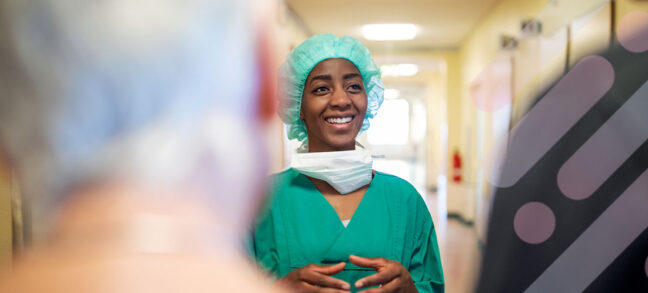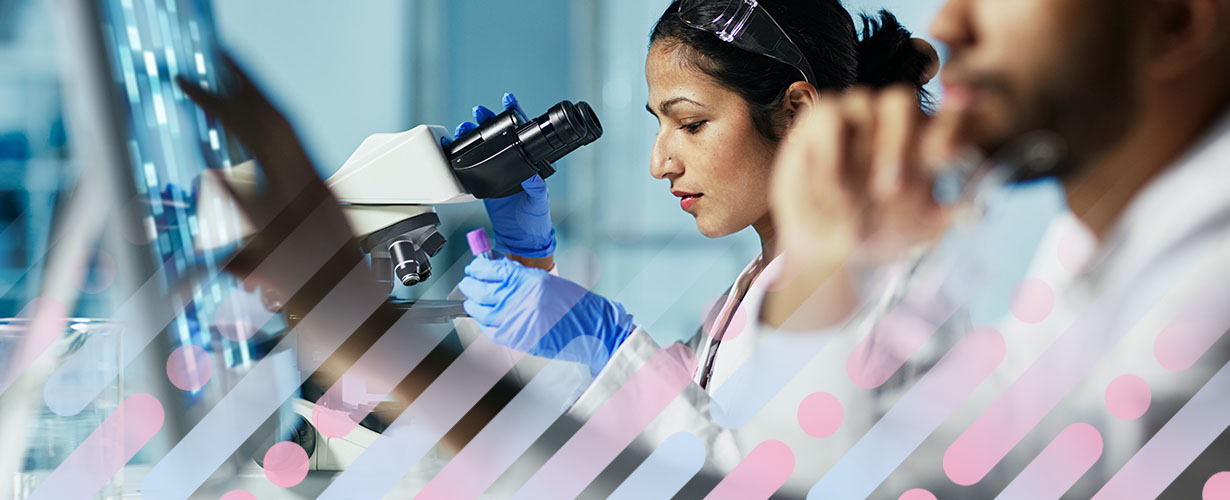For decades, clinicians have been working to understand the connection between genetics and breast cancer. One of the biggest breakthroughs came in 1994, when geneticist Mark Skolnick and his team discovered the BRCA1 gene.1 Just one year later, a team of international scientists would go on to discover BRCA2.2 The uncovering of both of these genes has given many women a better understanding of their risks, and ultimately, more control over their journeys. In the 25 years since these discoveries, scientists have learned even more about these mutations and the options carriers have for reducing their increased risk of breast cancer.3
Dr. Pankaj Tiwari, a board-certified plastic surgeon who specializes in breast and nerve reconstruction in the wake of a mastectomy, explains how these advancements have changed the health journey for women with breast cancer. “As we see an increased study and more markers that carry the risk for breast cancer moving forward, we’ll see a generational shift where patients are not coming in for the diagnosis of breast cancer, but for risk reduction.”
We’ve already seen how advancements in early screening and treatment have resulted in mortality rates dropping drastically in the past 30 years,4 so it’s exciting to see how the shift Dr. Tiwari foresees will further impact the breast cancer journey.
time to take control
One of the most impactful benefits genetic testing can bring to this journey is the gift of time—time to learn about your options, time to weigh your choices and time to develop the best possible course of action.
“[BRCA gene patients] are our most sophisticated patient. They come armed with information. They are much more aware of their options. They’re active in their communities and groups like FORCE [Facing Our Risk of Cancer Empowered] and Facebook groups where people are sharing information readily,” Dr. Tiwari says. “They have a real drive toward outstanding outcomes and transparency in the way things are done. It’s a pattern where the genetics drive the types of care that patients seek.”
powerful knowledge
It can be scary to go through any type of testing that might indicate your health could be at risk, but it’s important to remember understanding your risks can give you power to mitigate them. Dr. Tiwari explains who can benefit from the answers genetic testing can offer. “Anyone who has been diagnosed with breast cancer at a young age. Patients under 40 with two first-degree relatives, such as a mother or sister who’s been diagnosed with breast cancer. And anybody with a male member of their family who has been diagnosed with breast cancer.”
If you do test positive for the BRCA1 or BRCA2 gene, research has found your lifetime risk of breast cancer increases to 64% and 45%, respectively.5 Armed with an understanding of this risk, you can start to formulate a plan.
“Prior to genetic understanding, I think patients had fewer options as far as treatment pathways are concerned. Ultimately the more options and avenues to diagnose cancer at earlier stages with genetic testing and early screening, the better,” Dr. Tiwari says.
proactive screening
For some patients with a genetic mutation linked to breast cancer, their plan may include a more aggressive screening schedule. Some experts suggest patients with BRCA1 or BRCA2 should undergo clinical screening at the age of 25.6 The American Cancer Society recommends these patients get annual mammograms at 30,7 15 years earlier than the recommended age for patients without these genetic markers.8
By staying on top of this screening schedule, patients improve their chances of catching cancer in early stages when the chance of survival is at its highest.9 In fact, when cancer is caught before it spreads beyond the breast, the five-year survival rate is 99%,10
preventive options
In addition to screening, there are a number of preventive treatments patients can undergo to reduce their risk if they’ve tested positive for a genetic marker linked to breast cancer. One of the most effective options is a double mastectomy, which can reduce risk by 90%.11 Another surgery, prophylactic salpingo-oophorectomy, which involves the removal of the ovaries and fallopian tubes, can reduce the risk by 50%.12
Nonsurgical prevention includes a range of hormone therapies, which can reduce the risk of hormone-receptor-positive breast cancer, but they have no impact on the risk levels of hormone-receptor-negative breast cancers.13
care on your terms
Regardless of your care plan, Dr. Tiwari explains how genetic screening allows women to get the treatment they need on their own terms. “We’re seeing cases where someone might be a patient carrier with a genetic mutation, and they choose to schedule their surgery when it works best for them. For instance, maybe she’s a 27-year-old school teacher who’d like to have her breast risk-reduction surgery with a bilateral mastectomy and reconstruction in the spring of next year because that’s when she has leave from her job.”
This flexibility also allows patients to make plans to receive the best possible care for their needs, even if that means traveling to work with the physicians they feel most comfortable with. Patients can also take the time to look ahead to their reconstruction and consider options that may allow them to restore not only the look of their breasts, but also the sensation.
“There is a young woman who lives two hours north of us who is a genetic mutation carrier. She came in asking for bilateral reconstruction with Resensation®—a surgical technique that allows us to return sensation to the breast after a mastectomy. She’s motivated, educated and understands her options. She’s seeking out physicians who can provide this high quality of care. And I think we’ll see many more of these patients in the future.”
the complexities of genetic testing
By its very nature, genetic testing can impact family members just as much as the patients themselves. Dr. Tiwari explains, “There may be a patient diagnosed with a genetic cancer who has relatives they are not in touch with. It introduces this level of confusion and responsibility they may not be prepared to address.”
In addition to making decisions around how to communicate the results and with whom, parents can have complicated feelings around the possibility that they may pass their own risk onto a child.14 Thankfully, the medical community has tools to help patients navigate these emotional pitfalls, as well as the decisions they need to make around their care.15
“Genetic counseling is part of the center of care for breast cancer patients. They can help assess their genetic risk profile not only for the immediate family members but for both first- and second-degree relatives. I think this has become an important part of breast cancer treatment, and I think we’ll see genetic counselors play a larger role in team discussions around how to help these patients,” says Dr. Tiwari.
it’s your journey
With all the conversations around genetic testing, everyone has their own opinion about what women should or shouldn’t do with their results. But if we’ve learned anything from our advancements in genetic testing, it’s that a woman should be in control of her care as much as possible. Remember, it’s your journey. Take the time to understand your results, discuss your options with a qualified care team, consider what you want in the long term and advocate for reconstruction that meets all your needs, including, potentially, restored sensation.
If you’d like to talk to a surgeon like Dr. Tiwari about your options for reconstruction following a preventive mastectomy, use our surgeon locator tool to find a surgeon in your area.
Dr. Tiwari did not receive compensation from Axogen Corporation for his time in connection with this interview.
1 Science. 1994 Oct 7;266(5182):66-71.
2 Nature. 1995 Dec 21-28;378(6559):789-92.
3 Murthy P, Muggia F. Women’s cancers: how the discovery of BRCA genes is driving current concepts of cancer biology and therapeutics. Ecancermedicalscience. 2019;13:904. Published 2019 Feb 14. doi:10.3332/ecancer.2019.904
4 13 SEER Registries, National Cancer Institute, 2017. https://seer.cancer.gov/archive/csr/1975_2014/
5 AJHG Volume 72, Issue 5, May 2003, Pages 1117-1130
6 Burke W, Daly M, Garber J, et al. Recommendations for follow-up care of individuals with an inherited predisposition to cancer. II. BRCA1 and BRCA2. Cancer Genetics Studies Consortium. JAMA 1997; 277(12):997–1003
9 American Cancer Society. Cancer Facts & Figures 2019. Atlanta: American Cancer Society; 2019. https://www.cancer.org/content/dam/cancer-org/research/cancer-facts-and-statistics/annual-cancer-facts-and-figures/2019/cancer-facts-and-figures-2019.pdf
10 13 SEER Registries, National Cancer Institute, 2017. https://seer.cancer.gov/archive/csr/1975_2014/
11 Hartmann LC, Schaid DJ, Woods JE, et al. Efficacy of bilateral prophylactic mastectomy in women with a family history of breast cancer. New England Journal of Medicine 1999; 340(2):77-84. https://www.ncbi.nlm.nih.gov/pubmed/9887158
12Jatoi I. Risk-Reducing Options for Women with a Hereditary Breast Cancer Predisposition. Eur J Breast Health. 2018;14(4):189–193. Published 2018 Oct 1. doi:10.5152/ejbh.2018.4324 https://www.ncbi.nlm.nih.gov/pmc/articles/PMC6170022/
13 Uray IP, Brown PH. Chemoprevention of hormone receptor-negative breast cancer: new approaches needed. Recent Results Cancer Res. 2011;188:147–162. doi:10.1007/978-3-642-10858-7_13 https://www.ncbi.nlm.nih.gov/pmc/articles/PMC3415693/
14 Werner-Lin A, Rubin LR, Doyle M, et al. “My funky genetics”: BRCA1/2 mutation carriers’ understanding of genetic inheritance and reproductive merger in the context of new reprogenetic technologies. Fam Syst Health. 2012;30(2):166–180. doi:10.1037/a0028434 https://www.ncbi.nlm.nih.gov/pmc/articles/PMC4229842/
15 https://ww5.komen.org/BreastCancer/GeneMutationsampGeneticTesting.html#issues
Resensation Blog

How does mastectomy impact the nerves in the breast?
One sometimes overlooked aspect of mastectomy is its impact on nerves. Read what happens to nerves during mastectomy and explore…
Read More
What happens during implant breast reconstruction with Resensation®?
By repairing sensory nerves, Resensation® enables you to potentially regain sensation to your chest. Read how this procedure works during…
Read More
how resensation® helped Leanna feel secure in her family’s future
With Resensation®, Leanna can be there to watch her kids grow up—without losing the feeling of being whole.
Read More
sensory retraining: what is it, and how can it help me after resensation®?
Sensory retraining is a series of exercises designed to help you reconnect with your body after breast reconstruction with Resensation®.
Read More